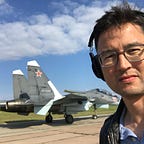No Country for Young Men
Dagestan’s Islamic insurgents are fighting a holy war from the cliffs that tower above us.
If I had things my way, I’d head down to Derbent, the ancient seaside fortress that served as the gateway to the Caucasus for millennia. But Ilyas Kayayev, who has assumed the role of my guide, host and surrogate uncle in Dagestan, has other plans. He wants to take me deep into the mountains to the ancestral homeland of his Lak people. How can I refuse?
We leave Makhachkala by silver Land Cruiser early in the morning. We head out of town on the old airport highway, passing large homes, some sporting the turrets and towers favored by rich Russians. The scrubby outskirts of the city hardly make for a luxurious environment, but construction is everywhere. The area is called Lazurny Bereg, Russian for Côte d’Azur.
We continue south along the Caspian coast. A few miles after Kaspiysk, a glum town of Soviet-era high-rises, we turn west, straight into the mountains. Fog shrouds the road.
After a quarter of an hour, we drive past a police checkpoint. There are a lot of boyeviki – fighters – in these parts, Ilyas says laconically. As we climb higher and higher, we get a view down on Gubden, a hotbed of Islamist sentiment. A British colleague who sneaked into the town a month earlier was detained by local police, then questioned and escorted back to Makhachkala.
Photo: Lucian Kim
Ilyas downplays the danger of religious extremism. For him, the issue of ethnicity is much more volatile in Dagestan, where a dozen nationalities vie for influence. Ilyas is sure that Laks – the province’s fifth largest ethnic group – face discrimination from Avars, Dargins, Lezghins and Kumyks. He sees it as his mission to show me this injustice.
We drive past a parched river and white, arid hills. This is Dargin land, Ilyas says. During the 1980s, Soviet Army drivers trained here because of the terrain’s similarity to Afghanistan. Today Dagestan’s homegrown Mujahideen imagine themselves in a holy war against infidels fought from the cliffs and rock formations that tower above us.
We pass a billboard for Vladimir Putin’s ruling party displaying a picture of a combine and the words “United Russia: The Party of Real Business.” There’s roadwork outside the sprawling, ramshackle village of Levashy. Not a coincidence, Ilyas jokes. This is where provincial leader Magomedsalam Magomedov is from.
We follow a winding road on toward Khadzhalmakhi. Second-hand stoves and refrigerators line the side of the road, and the hillsides are strewn with garbage. One shop has a Gucci sign in front of it. The valley is famous for its apricots because it doesn’t snow here, Ilyas says.
Finally we reach Lak country. Our first stop is Kumukh, the regional center and hometown of Ilyas’s parents.
Photo: Lucian Kim
Ilyas takes me to the mosque, which dates back to the 8th-century Arab conquest. It’s a plain stone building that has undergone extensive reconstruction over the centuries.
Next we visit the local cemetery, located on an overgrown field next to a lot filled with old tractors. Trash is scattered among the countless tombstones with ornate inscriptions in Arabic calligraphy. Some gravestones have sunk into the ground, others stand taller than a man. They belong in a museum, Ilyas says.
Nearby is a contemporary graveyard, where Ilyas pays his respects to a cousin, Kamil, who is buried there. A doctor, Kamil was sent to Chernobyl after the 1986 nuclear disaster. He died eight years later, at age 45.
Photo: Lucian Kim
The birthplace of Ilyas’s mother, a two-story stone house with a white wooden oriel, is without a doubt the most handsome building in Kumukh. Ilyas’s 92-year-old uncle is sitting on a bench outside as chickens peck in the dirt behind him. His eyes light up when he realizes he has visitors. He is the town’s last surviving frontovik, or World War II front-line veteran.
Ilyas and I trudge up to the remains of the crenellated wall that once crowned Kumukh and guarded the three trade routes that intersected here. On a nearby hilltop there’s a monument to the first Dagestani cosmonaut.
Once this place used to be the economic and political center of Dagestan, Ilyas says. Today it’s a forgotten backwater. I see no sign of commerce – or, for that matter, people. The streets are empty.
Resentment on the part of larger, more powerful ethnic groups means there’s neither a sewage system nor a natural-gas line in Kumukh, Ilyas complains.
“All that’s left for the Laks is their history,” he says.
After noon, we leave the town, heading south on the unpaved road to Vachi. Though we pass few cars, the roadside is littered with plastic bags and bottles.
Photo: Lucian Kim
Amir and Renat, friends of Ilyas, are waiting for us with a picnic on a windy hilltop. They’ve brought a pot of potatoes and fatty, coarse sausage to help the vodka go down smoother. As we make the ritual toasts, Ilyas points into the mountains. Up there, near the village of Tsisha, lies buried an ancient city that was once bigger than Derbent. Russian archaeologists started digging for it, but then the excavation was stopped – more proof of efforts to deny Laks their heritage.
Amir leads us to his home in Sumbatl, a couple of miles up the road. Besides another wizened graveyard, there are few signs of the village’s long history; it was founded in the 1st century by the Armenian warrior Sumbat. In a nearby valley is the hamlet of Tsovkra, home to Dagestan’s legendary tightrope walkers.
Dumplings, chicken and sausage await us at Amir’s place. So does the inevitable bottle of vodka or two. I become an honorary Lak for the day.
It’s a long drive back to Makhachkala. When we get out of the car, Ilyas takes a pistol out of the glove compartment.
You never know, he says. Better safe than sorry.
